Lease and Rental Agreements: Legal Considerations for Tenants and Landlords
Introduction
Lease and rental agreements play a crucial role in defining the relationship between tenants and landlords. Whether you are a tenant searching for a new home or a landlord looking to lease your property, understanding the legal aspects of these agreements is vital. In this blog post, we will explore the key legal considerations for both tenants and landlords when entering into a lease or rental agreement.
1. Understanding the Basics of Lease and Rental Agreements
Before delving into the legal considerations, it is important to understand the basics of lease and rental agreements. A lease agreement is a written contract between a landlord and a tenant that outlines the terms and conditions of occupying a property for a specific period. On the other hand, a rental agreement is a more flexible arrangement, often used for shorter periods or on a month-to-month basis.
2. Key Provisions to Include in Lease and Rental Agreements
To ensure a fair and legally binding agreement, both tenants and landlords should pay attention to certain key provisions. These provisions include:
– Rental amount: Clearly specify the amount of rent to be paid, along with any applicable late fees or penalties for non-payment.
– Duration of the agreement: State the start and end dates of the agreement, including any provisions for renewal or termination.
– Security deposit: Detail the amount of the security deposit and the conditions under which it will be returned at the end of the tenancy.
– Maintenance responsibilities: Clearly outline the responsibilities of both the tenant and the landlord when it comes to property maintenance and repairs.
– Use of the property: Define the permitted uses of the property and any restrictions or limitations that apply.
3. Tenant’s Rights and Obligations
Tenants have certain rights and obligations that are protected by the law. It is important for tenants to understand these rights and exercise them appropriately. Some key rights and obligations include:
– Right to quiet enjoyment: Tenants have the right to enjoy the property without interference from the landlord, as long as they comply with the terms of the agreement.
– Responsibility to pay rent on time: Tenants must pay the rent on time, as specified in the agreement, and inform the landlord promptly if they are unable to do so.
– Maintenance obligations: Tenants should take reasonable care of the property and report any maintenance issues to the landlord in a timely manner.
– Right to privacy: Landlords must provide tenants with reasonable notice before entering the property, except in cases of emergency.
4. Landlord’s Rights and Obligations
Landlords also have certain rights and obligations when it comes to lease and rental agreements. Understanding these rights and obligations is essential for landlords to protect their interests. Some key rights and obligations include:
– Right to receive rent: Landlords have the right to receive rent payments in a timely manner, as agreed upon in the agreement.
– Responsibility to provide habitable conditions: Landlords must ensure that the property is safe and habitable, complying with all applicable health and safety regulations.
– Right to access the property: Landlords have the right to access the property for certain reasons, such as inspections or repairs, with proper notice to the tenant.
– Responsibility to return the security deposit: At the end of the tenancy, landlords are required to return the security deposit, minus any deductions for damages beyond normal wear and tear.
Conclusion
Lease and rental agreements are essential tools for establishing a clear understanding between tenants and landlords. By understanding the legal considerations involved in these agreements, both parties can ensure a fair and transparent relationship. If you have further questions or need legal advice regarding lease and rental agreements, it is recommended to consult a qualified solicitor.
